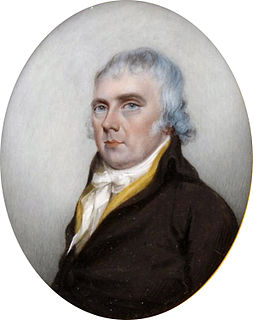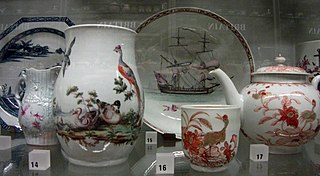
Josiah Wedgwood was an English potter, entrepreneur, and abolitionist. Founding the Wedgwood company in 1759, he developed improved pottery bodies by systematic experimentation, and was the leader in the industrialisation of the manufacture of European pottery.

Thomas Whieldon was a significant English potter who played a leading role in the development of Staffordshire pottery.

Josiah Spode was an English potter and the founder of the English Spode pottery works which became famous for the high quality of its wares. He is often credited with the establishment of blue underglaze transfer printing in Staffordshire in 1781–84, and with the definition and introduction in c. 1789–91 of the improved formula for bone china which thereafter remained the standard for all English wares of this kind.

Josiah Wedgwood II, the son of the English potter Josiah Wedgwood, continued his father's firm and was a Member of Parliament (MP) for Stoke-upon-Trent from 1832 to 1835. He was an abolitionist, and detested slavery.

The Staffordshire Potteries is the industrial area encompassing the six towns Burslem, Fenton, Hanley, Longton, Stoke and Tunstall, that now make up the city of Stoke-on-Trent in Staffordshire, England. North Staffordshire became a centre of ceramic production in the early 17th century, due to the local availability of clay, salt, lead and coal.

Tunstall is one of the six towns that, along with Burslem, Longton, Fenton, Hanley and Stoke-upon-Trent, amalgamated to form the City of Stoke-on-Trent in Staffordshire, England. It was one of the original six towns that federated to form the city. Tunstall is the most northern, and fourth largest town of the Potteries. It is situated in the very northwest of the city borough, with its north and west boundaries being the city limit. It stands on a ridge of land between Fowlea Brook to the west and Scotia Brook to the east, surrounded by old tile making and brick making sites, some of which date back to the Middle Ages.
Josiah "Joe" Wedgwood III, a grandson of the English potter Josiah Wedgwood.
Godfrey Wedgwood was a partner in the Wedgwood pottery firm from 1859 to 1891.
Thomas Wedgwood IV was an English master potter who taught his illustrious youngest brother Josiah Wedgwood the trade.
John Wedgwood, the eldest son of the potter Josiah Wedgwood, was a partner in the Wedgwood pottery firm 1790–1793 and again 1800–1812.

Major Cecil Wedgwood, DSO was a British soldier and partner in the Wedgwood pottery firm. He was the first Mayor of Stoke-on-Trent.
Clement Francis Wedgwood was an English businessman, a partner in the Wedgwood pottery firm.

Wedgwood is an English fine china, porcelain and luxury accessories manufacturer that was founded on 1 May 1759 by the potter and entrepreneur Josiah Wedgwood and was first incorporated in 1895 as Josiah Wedgwood and Sons Ltd. It was rapidly successful and was soon one of the largest manufacturers of Staffordshire pottery, "a firm that has done more to spread the knowledge and enhance the reputation of British ceramic art than any other manufacturer", exporting across Europe as far as Russia, and to the Americas. It was especially successful at producing fine earthenware and stoneware that were accepted as equivalent in quality to porcelain but were considerably cheaper.

John Astbury (1688–1743) was an English potter credited with innovations and improvements in earthenware associated with Staffordshire figures.

The Wedgwood Institute is a large red-brick building that stands in Queen Street, in the town of Burslem, Stoke-on-Trent, Staffordshire, England. It is sometimes called the Wedgwood Memorial Institute, but it is not to be confused with the former Wedgwood Memorial College in Barlaston. It achieved listed building status in 1972.

William Adams was an English potter, a maker of fine jasperware shortly after its development and introduction to the English market by Wedgwood.
Sir Hugo Martin Wedgwood, 3rd Baronet, was a British stockbroker and linguist.

Enoch Wood (1759–1840) was an English potter and businessman, from one of the major families in Staffordshire pottery. Starting as a modeller, he established a successful business in Burslem in the Staffordshire Potteries, from 1790-1818 trading as Wood and Caldwell. In the 18th century they produced many Staffordshire figures, which Wood modelled himself, and other types of earthenware and stoneware. After 1818 his company, now Enoch Wood & Sons, produced large quantities of blue and white transfer-printed tableware in earthenware, much of which was exported to America.

Richard Chaffers was a pottery manufacturer in Liverpool, England.
Cecily Stella Wedgwood, known as Star Wedgwood, was a British ceramicist.